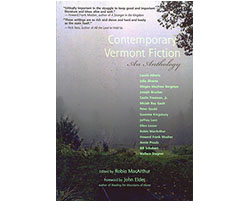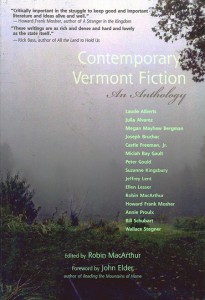
 copyright the Chronicle January 21, 2015
copyright the Chronicle January 21, 2015
Reviewed by Tena Starr
Contemporary Vermont Fiction, an Anthology. Edited by Robin MacArthur. Published by Green Writers Press. Paperback. 226 pages. $21.00.
Vermont has a lot of writers. In fact, I’ve heard, or read, that it has more writers, per capita, than any other state.
What editor Robin MacArthur has done with this anthology is collect some of the best work of some of the best of them. The book includes pieces by Howard Frank Mosher, Julia Alvarez, Castle Freeman Jr., Wallace Stegner, Annie Proulx, and Bill Schubart, as well as from at least a half dozen perhaps less familiar, but no less moving, writers.
Ms. MacArthur readily admits that her selection is subjective, and that no doubt there are many more stories out there that could just as easily have been included. But there is method behind her choices, too. She says in the introduction that she set out to portray much more than the picture postcard Vermont.
And in that she has succeeded. The stories are about old hill farmers, loggers, “hippies” and the back to the land movement, the conflict between well-to-do newcomers and hardscrabble natives, poverty, war, and death.
Ms. MacArthur wrote in the book’s introduction that she started writing and collecting stories about Vermont when she went off to college nearly two decades ago and found herself homesick.
“I found Annie Proulx’s Heart Songs and Howard Frank Mosher’s Where the Rivers Flow North, two books that made my skin prickle and my heart grin,” she wrote. “They not only rendered the landscape I was pining for — old hillside farms, wooded swamps, hilltop cabins — but they portrayed some of the complexities I wanted to explain to my Ivy League classmates who said, ‘Oh Vermont! I have a ski house there’ when I mentioned where I was from. No, I wanted to say (but never said) to those classmates. That is not where I am from.”
I plunged into this book eagerly, and was met with surprises. I should say that I’m not much of a fan of short stories. I prefer immersion reading, which requires something of length. But many of these writers are familiar to me, and they have something to say.
One of the stories that most interested me is by Peter Gould, a veteran of the back to the land movement. It’s a fine piece of writing that tells the story of all that idealism that prompted people to work absurdly hard to recreate what native Vermonters would have been only too happy to give up, if they could.
The story is called “Horse-Drawn Yoghurt,” a reference to the night when it collapsed for Mr. Gould (or his fictional character), and modern America became too much of a temptation.
I’m not personally familiar with the back to the land movement. At the time, I was likely driving a tractor or cleaning the barn, but that was different — I was an Orleans County kid growing up on a dairy farm, and anxious enough to get away from it. We were fascinated by the commune up the road, though. The young people who lived there didn’t seem to be particularly industrious, but “hippies” were a novelty.
I know enough people, as an adult, however, who did join communes, or at least came here to live a life closer to the land, to know that Mr. Gould’s story rings true.
There are good stories here, heartfelt, insightful, caring. Many are short, glimpses of life in a harsh place that has its virtues but is rocky, with no shortage of characters or clashes between old and new.
For instance, Ms. Alvarez’ story, “A Light Out: A Vermont Story in Five Voices,” is a touching account of the plight of an undocumented Mexican farmworker, and the straitlaced old Vermont man who helps because, although he’s a law-abiding citizen, in the end compassion and decency trump the law.
Miciah Bay Gault has written a poignant story called “City of Lonely Women.” It’s about a young man’s first love, entwined with the dilemma of so many of Vermont’s young people: Should he stay with those he loves? Or leave in search of the opportunity his home so lacks?
Bill Schubart has done an admirable job of trying to recreate a French-Canadian wake. Howard Mosher has written a brief but moving story about a sick and aging French-Canadian logger’s recollections toward the end of his days. There are compelling stories about well-to-do newcomers who do not grasp that their role is not beneficent, nor even benign.
“I chose stories I found beautiful and complex,” Ms. MacArthur wrote. “A covey of voices not meant to represent the whole, but to illuminate pieces, or facets, from here and there.”
This is a book worth reading with fine stories by 15 of Vermont’s most accomplished writers.
contact Tena Starr at [email protected]
For more free articles from the Chronicle like this one, see our Reviews pages. For all the Chronicle’s stories, subscribe:
Print subscription
Annual online subscription
Short-term online subscription







